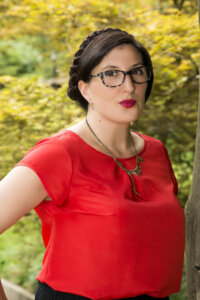Julianna Margulies is not your average ‘Karen’
The actress’ recent racist remarks bely white Jewish women’s conditional relationship to the privileges of white femininity

Julianna Margulies attends Apple TV+’s “The Morning Show” Photo Call at Four Seasons Hotel Los Angeles at Beverly Hills on September 08, 2021 in Los Angeles, California. Photo by Amy Sussman/Getty Images
Actress Julianna Margulies became infamous last week for something entirely unrelated to acting: during an appearance on the podcast The Back Room with Andy Ostroy, Margulies launched into a tirade against pro-Palestine college students, taking special aim at queer and Black students.
“The fact that the entire Black community isn’t standing with us to me says either they just don’t know, or they’ve been brainwashed to hate Jews,” Margulies told Ostroy.
Margulies has earned critical acclaim for her performances in shows like The Good Wife and ER. But when audio from the interview leaked on X, it was met with swift backlash and harsh criticism for Margulies, who issued an apology through Deadline shortly after.
For many commentators, Margulies’s remarks were one more instance of a progressive white woman pulling back the mask to reveal an entitled racist eager to wield power over Black people and other people of color; she was, in common parlance, just another Karen doing what Karens do. At a bare minimum, this perspective misunderstands the complex relationship that many white Jewish women have to white femininity; a tenuous bond based in conditional privilege and not the blithe entitlement of explicit whiteness.
Margulies has not been the only Jewish woman to find herself in this position over the past two months. Comedian Amy Schumer recently attempted to clarify her views on Israel-Palestine after getting accused of genocidal, anti-Arab rhetoric; her peer Sarah Silverman similarly sparked backlash after defending Israel’s decision to cut off power to Gaza in the early days of the war. Under the “Karen” framing, the explanation for all of these women’s actions seems clear: They are simply white women attempting to use their perceived vulnerability and innocence to enact violence against people of color. They are weaponizing white femininity to position themselves as victims when, in fact, they are the ones who are causing harm.
There is no question that these women have made abhorrent comments. But it seems overly simplistic to write off a trio of Jewish women as just another example of insensitive and entitled white women. Because unlike the prototypical Karen, white Jewish women can never be fully comfortable or confident in our own whiteness — and it is that insecurity, far more than entitlement, that can result in the worst of our abuses.
In a recent essay on the dynamics of campus antisemitism, Megan Wachspress highlights the fragility of Jewish whiteness. She posits that the source of fear for white American Jews on campus since Oct. 7 is not that their classmates are Hamas sympathizers, but a sickening awareness that whiteness does not afford them the protection they once thought.
“They are afraid of losing the status their parents and grandparents won in the diaspora,” Wachspress writes, “and the current anti-Israel protests suggest that that status may not be as secure as they had once thought. This fear is not irrational; losing the protection of whiteness is no small thing for people who may have grandparents or great-grandparents who survived the camps.”
For white Jewish women in particular, that dynamic can feel even more fraught. Many of us have grown up intimately aware of the way our Jewishness sets us apart. Stereotypically Jewish features like big noses and curly hair are positioned as unfeminine and ugly, problems to be fixed in our quest for mainstream acceptance. On film, Jewish women rarely get to be ingenues, more routinely depicted as nagging moms and frigid wives — except when we’re inappropriately sexual harlots.
Over and over, the world finds ways to tell Jewish women that we are never quite enough — not even, ironically, when it comes to playing Jewish women on screen. As Silverman herself has noted, some of the most prominent female Jewish characters in recent film and TV projects have all been played by non-Jews.
And so it is perhaps unsurprising that many white Jewish women would attempt to compensate for this tenuous position by leaning into their whiteness and privilege. In previous eras, we saw this in the form of the “Jewish American Princess,” who heralded her arrival in the American middle or upper class through the conspicuous consumption of designer clothes and other trappings of wealth. Notably, “JAPs” were also assumed to be spoiled, entitled, and willing to weaponize their feminine vulnerability in order to get their own selfish way (Parks and Recreation’s Mona Lisa Saperstein character is the epitome of the stereotype).
Setting aside the classism, sexism and antisemitism inherent in dismissing Jewish women as JAPs, it is easy to see how a group of women, newly arrived to whiteness and middle-class stability, might aggressively pursue the trappings of white womanhood — clothes, entitlement and the ability to demand protection from harm — in order to secure their position.
And it is also easy to see how, in the wake of one of the greatest modern traumas collectively faced by Jewish people around the world, a subset of white Jewish women might channel their inner Karen in order to pursue a sense of safety. Recognizing that does not excuse the racist, homophobic, or otherwise bigoted things these women might say as they attempt to shore up their own claim to whiteness.
But it does illuminate the fact that white Jewish women are a different form of Karen — one whose manipulations are rooted, not in the confidence of unambiguous whiteness, but in the anxiety of conditional privilege.
To contact the author, email [email protected].
A message from our Publisher & CEO Rachel Fishman Feddersen

I hope you appreciated this article. Before you go, I’d like to ask you to please support the Forward’s award-winning, nonprofit journalism so that we can be prepared for whatever news 2025 brings.
At a time when other newsrooms are closing or cutting back, the Forward has removed its paywall and invested additional resources to report on the ground from Israel and around the U.S. on the impact of the war, rising antisemitism and polarized discourse.
Readers like you make it all possible. Support our work by becoming a Forward Member and connect with our journalism and your community.
— Rachel Fishman Feddersen, Publisher and CEO





























